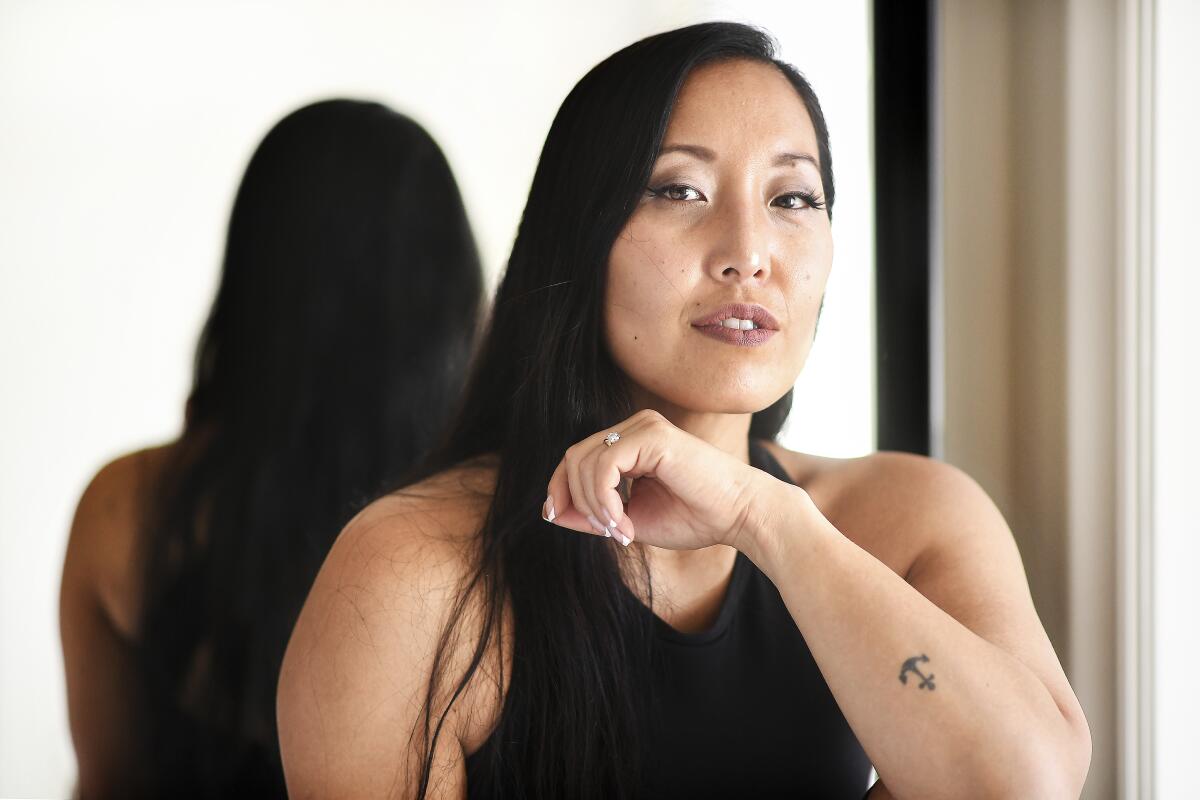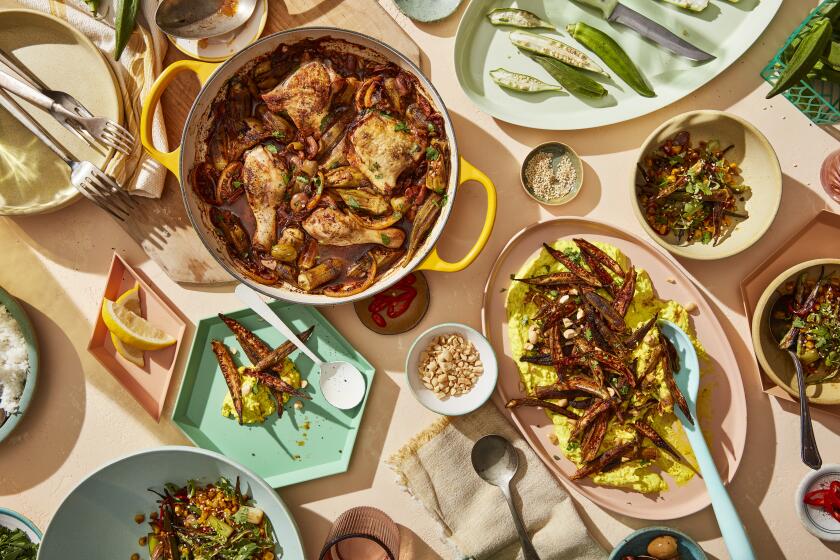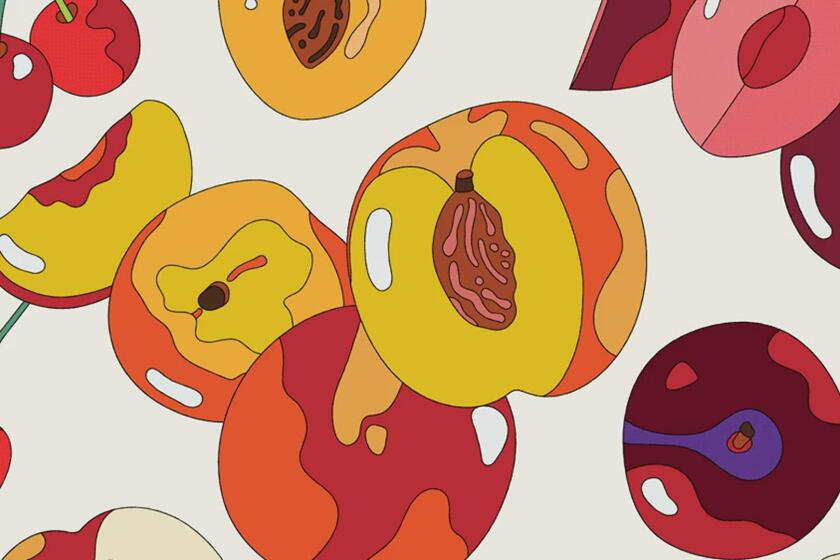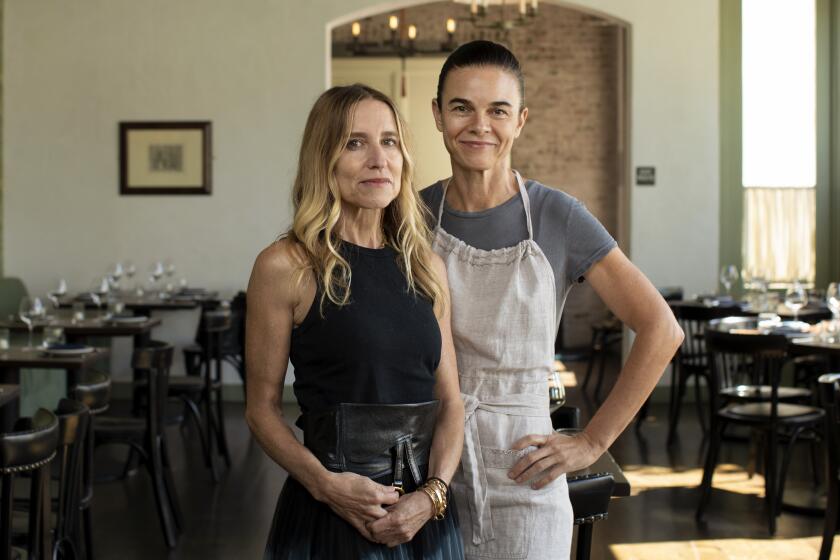Can Joanne Lee Molinaro, the Korean Vegan, ever stop overachieving?

- Share via
When you lay out the facts about Joanne Lee Molinaro, also known as the Korean Vegan, she starts to sound a bit like the meme version of Chuck Norris: Joanne Lee Molinaro is a cookbook author, food blogger and partner at a major law firm; Joanne Lee Molinaro became a TikTok star in her free time; Joanne Lee Molinaro runs long distances for fun.
Now that her social media empire — more than 450,000 followers on Instagram and more than 2.4 million on TikTok — requires more of her time, she concedes that she’s scaled back her running, adjusting her weekly goal from 35 to 45 miles to just over 25. “I’m very goal-oriented,” she says when asked about her intimidating hobby over Zoom. “If you tell me ‘this is your mileage for the week’ and I don’t hit it by even a mile, I start to hate myself.”
I’m a lawyer turned novelist, and I know a lot of artistic lawyers and former lawyers, most of us English majors with some level of risk aversion. Molinaro was an English major at the University of Illinois, Urbana-Champaign. She went to law school at the University of Chicago, then started working in the Chicago office of an international law firm. Remarkably, she is still there, a partner at the firm, focusing on bankruptcy and commercial litigation. She’s the first successful creative type I’ve ever come across actively working in Big Law. The expectation of constant availability, the tyranny of the billable hour — the lifestyle is not particularly amenable to time-consuming side hustles.
Even with her recent internet fame, she remains dedicated to her job, which she describes as “my actual job — you know, my job job.” Her legal work comes first: “That’s time that I’m not willing to negotiate or compromise. My clients need me.”
Of course, what was once a side project now demands a lot more effort, as she writes, shoots and edits videos for an audience of millions. When I spoke to her, she was coming off a light lawyering day, which she made into a 16-hour Korean Vegan day.
Molinaro started the Korean Vegan as a blog in 2016 after switching to a plant-based diet. She’s very open about her initial motivation for this conversion: Her boyfriend wanted to go vegan. “I decided, you know what, I really like this guy, and I think we have potential, but I can already sense that if I don’t become vegan with him, it’s going to hurt our relationship. Let’s just try it out.”
All the ways the slimy vegetable is eaten throughout the world and recipes that highlight its versatility.
She opened accounts on various social media platforms, most significantly Instagram, where she built a robust following. In 2018 she sold a book to Penguin called “The Korean Vegan Cookbook: Reflections and Recipes From Omma’s Kitchen” — a gorgeous compendium of recipes, stories and photography, all by Molinaro, scheduled for publication this October. But it’s through TikTok that she’s gained star influencer status.
She joined the platform in July 2020 to cope with pandemic lockdown, and it didn’t take long for her videos to start racking up hundreds of thousands, then millions, of views. Pre-orders for her cookbook started pouring in, pushing it onto Amazon bestseller lists, and in April she signed with talent agency UTA.
***
Molinaro, 42, grew up in an omnivorous Korean American household in Skokie, Ill., with Korean-born parents who spent their childhood years poor and hungry and believed they needed meat to stay strong. When her boyfriend raised the idea of going vegan, she worried that he was asking her to relinquish her cultural identity — no more Korean barbecue, no more salted squid or fried anchovies, no more stews swimming with pork belly, pork neck and Spam. “I didn’t think of veganism as anything other than a very rich, white type of diet,” she says.
“Once I stepped into the vegan universe, I started to get really uncomfortable with the kind of food options that I had available to me. There was that nagging sense of, ‘Well, how Korean can I possibly be if I’m eating this kind of food?’”
Faced with a paucity of vegan Korean food and recipes, she decided, “All right, I’m just gonna have to veganize all the Korean food that I grew up with.”
A season-by-season guide for preserving fruit in Southern California.
Before she became a vegan, Molinaro was fairly new to cooking. She’d never made some of her favorite comfort foods, like kimchi jjigae or jjajangmyun. She started going through traditional Korean recipes, consulting both food blogs and her home-cook mother, finding substitutions for meat and dairy as she went along. Far from weakening her connection to Korean food and culture, veganism, she says, has brought her Koreanness into focus. She even makes her own kimchi, a labor-intensive practice many of our second-generation cohort seems happy to leave to our parents.
Molinaro is nothing if not committed — not only did she make veganism work for her, she did it with joy and creativity, in a way that has resonated with her millions of followers. And she married that boyfriend. Anthony Molinaro, a professional pianist, composes and plays much of the music that accompanies his wife’s videos. He’s Molinaro’s second husband, and she speaks openly about their relationship in many of her posts. In one, from last December, a montage of making blueberry muffins is accompanied by her voice-over about egg freezing, regrets about her first marriage, and Anthony’s wedding proposal. It’s a lot of content for one minute (TikTok’s video length limit was 60 seconds until recently, when it increased to three minutes), but the writing and editing are seamless.
There’s nothing off-the-cuff about these videos — “ I write them literally word for word from beginning to end,” says Molinaro — but they feel raw and completely earnest. I got the same sense while talking to her on Zoom: She has something that most people don’t — a spellbinding combination of warmth, vulnerability and Type A intensity.
She talks bluntly about her lifelong battle with body dysmorphia and disordered eating. Calorie counting, feeling anxious when she isn’t hungry, “these are the things that I think I’m going to have to deal with for the rest of my life.” But, she says, her relationship with food is as healthy and stable as it’s ever been, in large part because she now eats with more purpose — to do her part to help the planet and the environment and reduce the killing of animals.
“I’m still very mindful about how [what I eat] impacts the way that I look in the mirror,” she says. “It’s just that that’s now one of many things that I’m thinking about when I eat, whereas before it was almost the only thing.” She also has her platform as the Korean Vegan, which turbocharges her ability to influence the way people eat and think.
A family’s journey
In a video posted in January, Molinaro cooks budae jjigae, or army stew — a spicy kitchen-sink-style stew that came out of the lean period in South Korea after the Korean War, made with surplus food from U.S. military bases. A typical budae jjigae incorporates ingredients like Spam or hot dog (and, traditionally, canned baked beans), but Molinaro’s version uses tofu and vegan sausage instead.
In voice-over, she speaks about her father’s English-language skills. She admits that she used to make fun of his accent and then talks about the time she showed him a poem she wrote in high school and he praised her, saying in accented English, “Wow, like Wordsworth!”
Her father majored in English at Yonsei University in Seoul and served as an English, Vietnamese and Korean translator in Vietnam during the Vietnam War. The video ends with a bubbling pot of budae jjigae, a statement of love and gratitude, and a photo of Molinaro and her father in front of the English building at Yonsei.
Suzanne Goin and Caroline Styne open a second, triumphant location of A.O.C. in Brentwood
Her father is a prominent figure in the Korean Vegan universe — in fact, family stories are a pillar of her TikTok, as important and inviting as the food. She talks about them as “immigrant stories” — Molinaro and her younger brother were born in Chicago but her parents, Jae Choong and Sun Bee, were born in what is now North Korea and faced enormous struggles (see “That Time My Grandparents Almost Killed My Mom,” a s’mores montage accompanied by a tale of starvation, thoughts of infanticide and chocolate).
Her father’s family moved to present-day South Korea at the end of World War II, and her mother’s family fled from her hometown, Ongjin, during the battle of Ongjin, the first conflict of the Korean War. Married in Seoul, the pair immigrated to the U.S. in the 1970s.
Molinaro started sharing these stories on social media after the 2016 election out of a need to channel her feelings of “panic, rage [and] betrayal” into something productive. “I actually tend to be pretty good at communicating. That’s what I do for a living,” she says. “What I wanted to do was to open a tiny little window into this world that I had grown up in.” She hoped to use that window to reach through and demolish — gently, without judgment — preconceived notions about Asian Americans and immigrants.
Her content is inclusive and moving and rarely confrontational (except on Twitter — “I don’t care about creating safety on Twitter,” she says), but there’s real power in the narration of her first encounter with racism played over a mouth-watering video recipe for ddukbokki skewers. Of all her accomplishments, this might be the most daunting: Joanne Lee Molinaro changes hearts and minds on the internet.
More to Read
Eat your way across L.A.
Get our weekly Tasting Notes newsletter for reviews, news and more.
You may occasionally receive promotional content from the Los Angeles Times.













